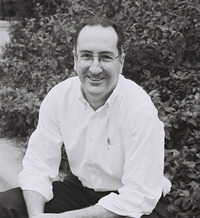Fred Turner
Born
April 04, 1961
Genre
More books by Fred Turner…
Related News
San Francisco is a gold rush town. There aren’t many books about people in their 20s who move to Silicon Valley with dreams of earning a living...
33 likes · 1 comments
“i began to see that i had commodified myself.... i created my interior thoughts as a means of production for the corporation that owned the board i was posting to, and that commodity was being sold to other commodity/consumer entities as entertainment.”
― From Counterculture to Cyberculture: Stewart Brand, the Whole Earth Network, and the Rise of Digital Utopianism
― From Counterculture to Cyberculture: Stewart Brand, the Whole Earth Network, and the Rise of Digital Utopianism
“Contrary to the perceptions of many in the counterculture in the 1960s and of many scholars since, the two worlds had a great deal in common. They shared a celebration of intellectual work, of technology, and of collaborative work styles. Both reveled in the economic and technological abundance of post-World War II America. The research laboratories of World War II, and the military-industrial-academic bureaucracies that grew out of them, were far more flexible, entrepreneurial, and individualistic places than many remember today. By the same token, certain elements of the counterculture embraced the ideas, the social practices, and the machines that emerged inside the world of military research even as they vocally attacked cold war bureaucracies. Even as they sought to find new ways to live psychologically and socially integrated lives, some members of the counterculture turned toward the heart of the technocracy itself in search of tools and models for their work.”
― From Counterculture to Cyberculture: Stewart Brand, the Whole Earth Network, and the Rise of Digital Utopianism
― From Counterculture to Cyberculture: Stewart Brand, the Whole Earth Network, and the Rise of Digital Utopianism
“Until the mid-1950s, universities such as Harvard and Yale often admitted students on the basis of family connections. By the mid-1960s, largely due to the rise of educational testing, more merit-based standards had taken hold, and students from a wider range of social backgrounds found themselves on campuses that had been off-limits to their parents.64”
― From Counterculture to Cyberculture: Stewart Brand, the Whole Earth Network, and the Rise of Digital Utopianism
― From Counterculture to Cyberculture: Stewart Brand, the Whole Earth Network, and the Rise of Digital Utopianism
Is this you? Let us know. If not, help out and invite Fred to Ĺ·±¦ÓéŔÖ.








































